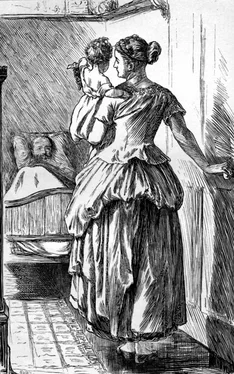"With your leave, sir," said Herr Müller, turning towards the door, "I will go and set all that right at once."
It was easier said than done. When I next saw Thekla, her eyes were swollen up with crying, but she was silent, almost defiant towards me. A look of resolute determination had settled down upon her face. I learnt afterwards that parts of my conversation with Herr Müller had been injudiciously quoted by him in the talk he had had with her. I thought I would leave her to herself, and wait till she unburdened herself of the feeling of unjust resentment towards me. But it was days before she spoke to me with anything like her former frankness. I had heard all about it from my host long before.
He had gone to her straight on leaving me; and like a foolish, impetuous lover, had spoken out his mind and his wishes to her in the presence of his sister, who, it must be remembered, had heard no explanation of the conduct which had given her propriety so great a shock the day before. Herr Müller thought to re-instate Thekla in his sister's good opinion by giving her in the Fräulein's very presence the highest possible mark of his own love and esteem. And there in the kitchen, where the Fräulein was deeply engaged in the hot work of making some delicate preserve on the stove, and ordering Thekla about with short, sharp displeasure in her tones, the master had come in, and possessing himself of the maiden's hand, had, to her infinite surprise—to his sister's infinite indignation—made her the offer of his heart, his wealth, his life; had begged of her to marry him. I could gather from his account that she had been in a state of trembling discomfiture at first; she had not spoken, but had twisted her hand out of his, and had covered her face with her apron. And then the Fräulein had burst forth—"accursed words" he called her speech. Thekla uncovered her face to listen; to listen to the end; to listen to the passionate recrimination between the brother and the sister. And then she went up, close up to the angry Fräulein, and had said quite quietly, but with a manner of final determination which had evidently sunk deep into her suitor's heart, and depressed him into hopelessness, that the Fräulein had no need to disturb herself; that on this very day she had been thinking of marrying another man, and that her heart was not like a room to let, into which as one tenant went out another might enter. Nevertheless, she felt the master's goodness. He had always treated her well from the time when she had entered the house as his servant. And she should be sorry to leave him; sorry to leave the children; very sorry to leave little Max: yes, she should even be sorry to leave the Fräulein, who was a good woman, only a little too apt to be hard on other women. But she had already been that very day and deposited her warning at the police office; the busy time would be soon over, and she should be glad to leave their service on All Saints' Day. Then (he thought) she had felt inclined to cry, for she suddenly braced herself up, and said, yes, she should be very glad; for somehow, though they had been kind to her, she had been very unhappy at Heppenheim; and she would go back to her home for a time, and see her old father and kind stepmother, and her nursling half-sister Ida, and be among her own people again.
I could see it was this last part that most of all rankled in Herr Müller's mind. In all probability Franz Weber was making his way back to Heppenheim too; and the bad suspicion would keep welling up that some lingering feeling for her old lover and disgraced playmate was making her so resolute to leave and return to Altenahr.
For some days after this I was the confidant of the whole household, excepting Thekla. She, poor creature, looked miserable enough; but the hardy, defiant expression was always on her face. Lottchen spoke out freely enough; the place would not be worth having if Thekla left it; it was she who had the head for everything, the patience for everything; who stood between all the under-servants and the Fräulein's tempers. As for the children, poor motherless children! Lottchen was sure that the master did not know what he was doing when he allowed his sister to turn Thekla away—and all for what? for having a lover, as every girl had who could get one. Why, the little boy Max slept in the room which Lottchen shared with Thekla; and she heard him in the night as quickly as if she was his mother; when she had been sitting up with me, when I was so ill, Lottchen had had to attend to him; and it was weary work after a hard day to have to get up and soothe a teething child; she knew she had been cross enough sometimes; but Thekla was always good and gentle with him, however tired he was. And as Lottchen left the room I could hear her repeating that she thought she should leave when Thekla went, for that her place would not be worth having.
Even the Fräulein had her word of regret—regret mingled with self-justification. She thought she had been quite right in speaking to Thekla for allowing such familiarities; how was she to know that the man was an old friend and playmate? He looked like a right profligate good-for-nothing. And to have a servant take up her scolding as an unpardonable offence, and persist in quitting her place, just when she had learnt all her work, and was so useful in the household—so useful that the Fräulein could never put up with any fresh, stupid house-maiden, but, sooner than take the trouble of teaching the new servant where everything was, and how to give out the stores if she was busy, she would go back to Worms. For, after all, housekeeping for a brother was thankless work; there was no satisfying men; and Heppenheim was but a poor ignorant village compared to Worms.
She must have spoken to her brother about her intention of leaving him, and returning to her former home; indeed a feeling of coolness had evidently grown up between the brother and sister during these latter days. When one evening Herr Müller brought in his pipe, and, as his custom had sometimes been, sat down by my stove to smoke, he looked gloomy and annoyed. I let him puff away, and take his own time. At length he began,—
"I have rid the village of him at last. I could not bear to have him here disgracing Thekla with speaking to her whenever she went to the vineyard or the fountain. I don't believe she likes him a bit."
"No more do I," I said. He turned on me.
"Then why did she speak to him at all? Why cannot she like an honest man who likes her? Why is she so bent on going home to Altenahr?"
"She speaks to him because she has known him from a child, and has a faithful pity for one whom she has known so innocent, and who is now so lost in all good men's regard. As for not liking an honest man—(though I may have my own opinion about that)—liking goes by fancy, as we say in English; and Altenahr is her home; her father's house is at Altenahr, as you know."
"I wonder if he will go there," quoth Herr Müller, after two or three more puffs. "He was fast at the 'Adler; he could not pay his score, so he kept on staying here, saying that he should receive a letter from a friend with money in a day or two; lying in wait, too, for Thekla, who is well-known and respected all through Heppenheim: so his being an old friend of hers made him have a kind of standing. I went in this morning and paid his score, on condition that he left the place this day; and he left the village as merrily as a cricket, caring no more for Thekla than for the Kaiser who built our church: for he never looked back at the 'Halbmond, but went whistling down the road."
"That is a good riddance," said I.
"Yes. But my sister says she must return to Worms. And Lottchen has given notice; she says the place will not be worth having when Thekla leaves. I wish I could give notice too."
"Try Thekla again."
Читать дальше












